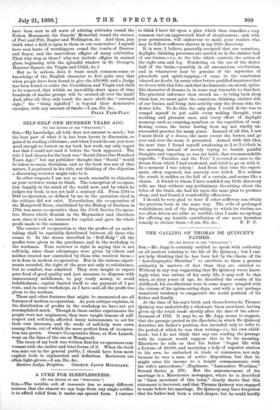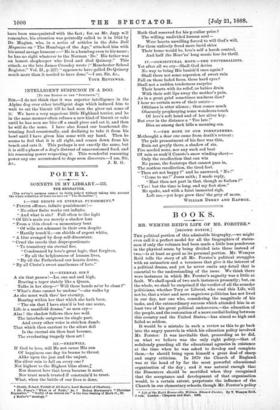THE CALLING OF THOMAS DE QUINCE Y'S FATHER.
[To THE EDITOR OF THE "SPECTATOR."]
Japp is certainly entitled to speak with authority on all matters relating to the life of De Quincey ; but I can- not help thinking that he has been led by the charm of the " Autobiographic Sketches " to attribute to them a greater authority in matters of fact than they are entitled to. Without in any way suggesting that De Quincey wrote know- ingly what was untrue of his early life, it may well be that when, at sixty years of age, he described the events of his childhood, his recollections were in some degree mingled with the visions of his opium-eating days, and with a not perhaps unnatural tendency to exaggerate the social position of his father and family.
At the time of his son's birth and thenceforwards, Thomas Quincey was undoubtedly a wholesale linen merchant, having given up the retail trade shortly after the date of the adver- tisement of 1783. It may be, as Mr. Japp seems to suggest, that the passage quoted in the Spectator, in which De Quincey describes his father's position, was intended only to refer to the period of which he was then writing—i.e., his own child- hood ; but I do not think that any one reading the passage with its context would suppose this to be its meaning. Elsewhere he tells us that his father " began life with a fortune of £6,000, and marrying a lady of superior station to his own, he embarked in trade or commerce, not only because he was a man of active disposition, but that he might raise his income to a height' commensurate with his wife's antecedents." (Espinasse, "Lancashire Worthies," Second Series, p. 379). But the announcement of his marriage in a Manchester newspaper, where he is described as " linen merchant of this town," clearly shows that this statement is incorrect, and that Thomas Quincey was engaged in trade before his marriage. De Quincey may have forgotten that his father had been a retail draper, but he could hardly have been unacquainted- with the fact ; for, as Mr. Japp remember, his attention was pointedly called to it in 1824 by Dr. Magian, who, in a series of articles in the John Bull Magazine on " The Humbugs of the Age," attacked him with his usual savage humour :—" He is a humbug even to his name; he has no right whatever to the Norman De.' His father was an honest shopkeeper who lived and died Quincey." This attack, as the late James Crossley wrote (" Manchester School Register," Vol. II., p. 227) " appears to have galled De Quincey much more than it needed to have done."—I am, Sir, &c.,
YOUR REVIEWER.



































 Previous page
Previous page